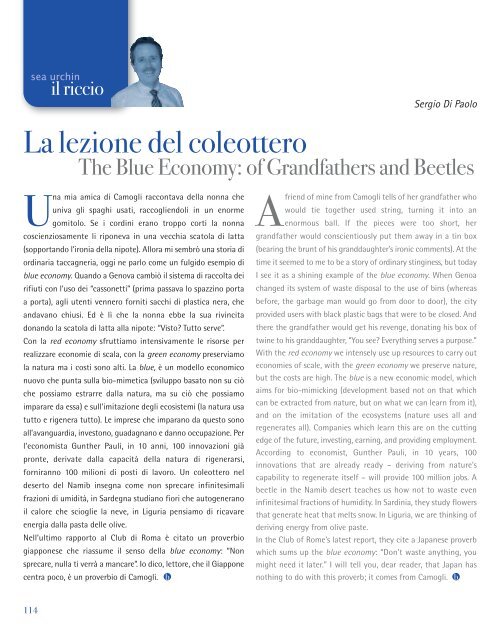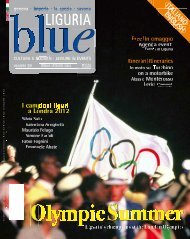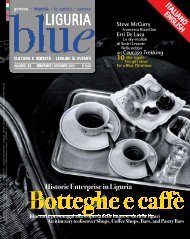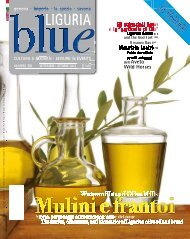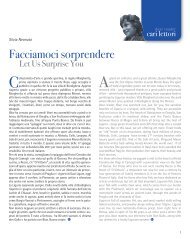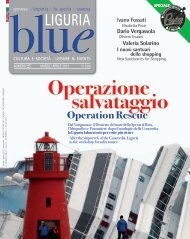cover - Blue Liguria - Sagep
cover - Blue Liguria - Sagep
cover - Blue Liguria - Sagep
You also want an ePaper? Increase the reach of your titles
YUMPU automatically turns print PDFs into web optimized ePapers that Google loves.
sea urchin<br />
il riccio<br />
Una mia amica di Camogli raccontava della nonna che<br />
univa gli spaghi usati, raccogliendoli in un enorme<br />
gomitolo. Se i cordini erano troppo corti la nonna<br />
coscienziosamente li riponeva in una vecchia scatola di latta<br />
(sopportando l’ironia della nipote). Allora mi sembrò una storia di<br />
ordinaria taccagneria, oggi ne parlo come un fulgido esempio di<br />
blue economy. Quando a Genova cambiò il sistema di raccolta dei<br />
rifiuti con l’uso dei “cassonetti” (prima passava lo spazzino porta<br />
a porta), agli utenti vennero forniti sacchi di plastica nera, che<br />
andavano chiusi. Ed è lì che la nonna ebbe la sua rivincita<br />
donando la scatola di latta alla nipote: “Visto? Tutto serve”.<br />
Con la red economy sfruttiamo intensivamente le risorse per<br />
realizzare economie di scala, con la green economy preserviamo<br />
la natura ma i costi sono alti. La blue, è un modello economico<br />
nuovo che punta sulla bio-mimetica (sviluppo basato non su ciò<br />
che possiamo estrarre dalla natura, ma su ciò che possiamo<br />
imparare da essa) e sull’imitazione degli ecosistemi (la natura usa<br />
tutto e rigenera tutto). Le imprese che imparano da questo sono<br />
all’avanguardia, investono, guadagnano e danno occupazione. Per<br />
l’economista Gunther Pauli, in 10 anni, 100 innovazioni già<br />
pronte, derivate dalla capacità della natura di rigenerarsi,<br />
forniranno 100 milioni di posti di lavoro. Un coleottero nel<br />
deserto del Namib insegna come non sprecare infinitesimali<br />
frazioni di umidità, in Sardegna studiano fiori che autogenerano<br />
il calore che scioglie la neve, in <strong>Liguria</strong> pensiamo di ricavare<br />
energia dalla pasta delle olive.<br />
Nell’ultimo rapporto al Club di Roma è citato un proverbio<br />
giapponese che riassume il senso della blue economy: “Non<br />
sprecare, nulla ti verrà a mancare”. Io dico, lettore, che il Giappone<br />
centra poco, è un proverbio di Camogli.<br />
Sergio Di Paolo<br />
La lezione del coleottero<br />
The <strong>Blue</strong> Economy: of Grandfathers and Beetles<br />
114<br />
Afriend of mine from Camogli tells of her grandfather who<br />
would tie together used string, turning it into an<br />
enormous ball. If the pieces were too short, her<br />
grandfather would conscientiously put them away in a tin box<br />
(bearing the brunt of his granddaughter’s ironic comments). At the<br />
time it seemed to me to be a story of ordinary stinginess, but today<br />
I see it as a shining example of the blue economy. When Genoa<br />
changed its system of waste disposal to the use of bins (whereas<br />
before, the garbage man would go from door to door), the city<br />
provided users with black plastic bags that were to be closed. And<br />
there the grandfather would get his revenge, donating his box of<br />
twine to his granddaughter, “You see? Everything serves a purpose.”<br />
With the red economy we intensely use up resources to carry out<br />
economies of scale, with the green economy we preserve nature,<br />
but the costs are high. The blue is a new economic model, which<br />
aims for bio-mimicking (development based not on that which<br />
can be extracted from nature, but on what we can learn from it),<br />
and on the imitation of the ecosystems (nature uses all and<br />
regenerates all). Companies which learn this are on the cutting<br />
edge of the future, investing, earning, and providing employment.<br />
According to economist, Gunther Pauli, in 10 years, 100<br />
innovations that are already ready – deriving from nature’s<br />
capability to regenerate itself – will provide 100 million jobs. A<br />
beetle in the Namib desert teaches us how not to waste even<br />
infinitesimal fractions of humidity. In Sardinia, they study flowers<br />
that generate heat that melts snow. In <strong>Liguria</strong>, we are thinking of<br />
deriving energy from olive paste.<br />
In the Club of Rome’s latest report, they cite a Japanese proverb<br />
which sums up the blue economy: “Don’t waste anything, you<br />
might need it later.” I will tell you, dear reader, that Japan has<br />
nothing to do with this proverb; it comes from Camogli.


